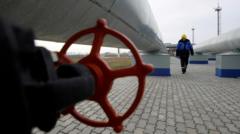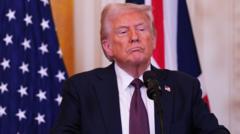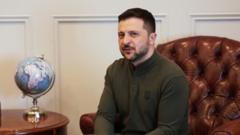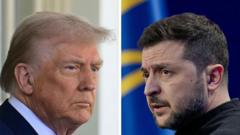The end of Russian gas supplies to Europe via Ukraine has triggered a multi-dimensional energy crisis. While the EU has prepared for this shift, countries like Slovakia and Moldova face serious repercussions. The move underscores the broader geopolitical tensions between Russia and European nations.
Europe Faces Energy Transition as Russian Gas Supply through Ukraine Halts

Europe Faces Energy Transition as Russian Gas Supply through Ukraine Halts
The cessation of Russian gas transit through Ukraine marks a significant shift in Europe's energy landscape, prompting fears and strategic recalibrations among member states.
As of Wednesday, the flow of Russian gas to European Union nations via Ukraine has come to a halt with the expiration of a five-year transit agreement. Ukrainian President Volodyr Zelensky announced his government's commitment to preventing Russia from profiting further, stating, "we will not allow them to earn additional billions on our blood." In a similar sentiment, the Polish government hailed the end of supplies as "another victory" against Moscow.
The European Commission has assured that most member states can manage the shift, although the situation is already proving dire for Moldova, which has been experiencing significant gas shortages. Despite this disruption, gas supplies to Hungary, Turkey, and Serbia can still proceed through the TurkStream pipeline.
Gazprom confirmed that it ceased gas exports via Ukraine at 08:00 local time on Wednesday. This transit route has been a vital channel for Russian gas since the dissolution of the Soviet Union, and while the immediate ramifications may seem manageable, the broader implications for Europe's energy strategy are complex. Russia stands to lose a crucial market while President Vladimir Putin claims that European nations will bear the brunt of the fallout.
Post the full-scale invasion of Ukraine in 2022, EU countries had already reduced their dependency on Russian gas, which constituted about €5 billion ($5.2 billion) annually. By 2023, Russian gas accounted for less than 10% of EU imports, a steep decline from 40% in 2021. However, countries like Slovakia and Austria continue to rely on significant gas imports from Russia, with Austria's energy regulator expressing confidence in the stability of supply through diversified channels and reserves.
Nevertheless, Slovakia is now frontline in Russian gas transit to the EU, raising tensions as it will likely face higher costs for alternative routes. Prime Minister Robert Fico has warned of the severe ramifications the cessation will have on EU energy security, while also threatening to cease electricity supplies to Ukraine—prompting swift backlash from Zelensky, who accused Fico of aiding Russian attempts to destabilize Ukraine.
Poland has stepped in with support plans for Ukraine, highlighting potential alternative supply routes through terminals in Croatia and connections from Germany. Polish Foreign Minister Radoslaw Sikorski indicated that all countries have managed to secure alternative routes and have diversified imports, including sourcing from the U.S. and Qatar.
The impact on Moldova has been severe, as it relies heavily on Russian gas for electricity. Tensions escalated when Gazprom threatened to restrict supply to Moldova, citing unpaid debts. Moldovan authorities vehemently denied any default and accused Russia of using energy as leverage for political manipulation.
As winter temperatures plummet, Moldovan officials have urged citizens to conserve energy and suggested methods of staying warm in the absence of gas supplies. The country has also instituted a 60-day energy state of emergency. Additionally, President Maia Sandu has denounced the Kremlin's actions as "blackmail," especially ahead of elections scheduled for 2025.
The EU is endeavoring to replace gas flows from Russia by turning more toward liquefied natural gas (LNG) imports from the U.S. and Qatar and accessing piped gas from Norway. Steps were outlined by the Commission in December to ensure alternatives to Ukrainian gas transit well into the future.






















